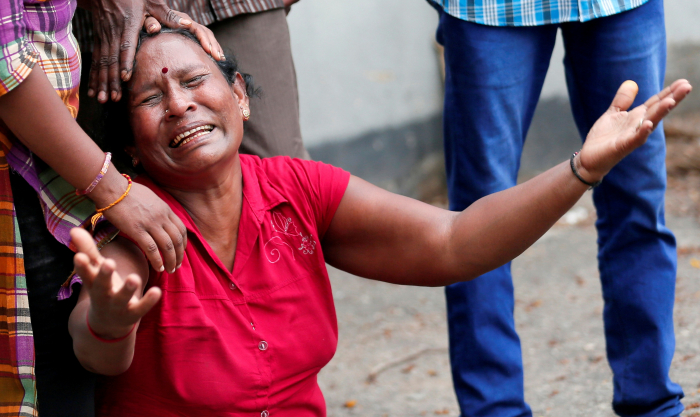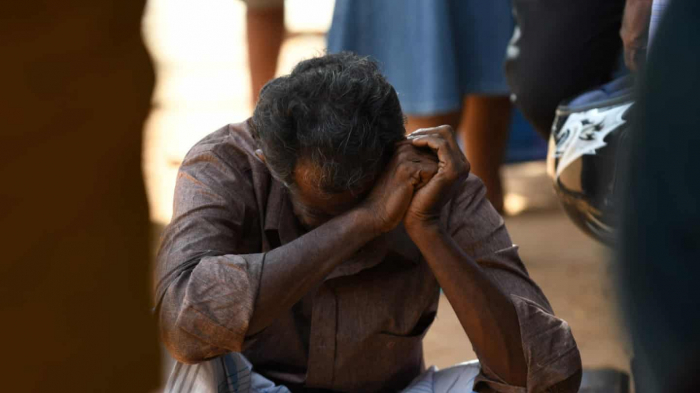My first reaction was panic. As I woke up to the horrific scenes from churches and hotels in Sri Lanka; to news of the dead, dying and injured, on a day of Christian celebration, I desperately rang loved ones, checked on cousins, uncles, aunts and friends. As further explosions occurred, and more deaths were reported, my heart pounded. Finally, I learned that my relatives were all OK, and I began to reflect on an atrocity that must not be allowed to divide Sri Lankans and take us back to the darkest days of the recent past.
I was born in Britain to Sri Lankan parents and have a Sri Lankan husband. As a Muslim I know too well the feeling of shock and fear when someone has tried to harm you in a place of worship. I felt today as I felt when I woke to news of the attack on worshippers in Christchurch, New Zealand, which left 51 people killed and dozens injured. Those Muslims had gone to Friday prayers on Jummah, a holy day.
Here in Britain many Muslims were fearful to go to their local mosques following that atrocity on the other side of the world. In the same way, many Christians will now be reluctant to go to church in places around the world where their communities have suffered hostility and intimidation. The fact that churches were targeted deliberately across Sri Lanka shows that this terrible, coordinated series of explosions was another attempt to instil fear among a religious minority.
It is disturbing to reflect that the warning signals have been there in terms of the treatment of religious minorities. When I visited the country to report on anti-Muslim riots that were happening in response to aggression and intimidation from the extremist Buddhist nationalist group, Bodu Bala Sena, the tension and anxiety among minorities was palpable. I came across flyers that targeted both Muslim and Christian minority groups in Sri Lanka, who account for 17% of Sri Lankan’s population. There were calls for a boycott of their shops. The president, Maithripala Siresena had promised to investigate hate crimes against minority groups after assuming power in 2015. Too little was done.

I have spoken to witnesses of attacks on Muslims, who told me that police stood by as the violence took place. Despite empty reassurances from the government, minority groups have long felt unprotected. It was a scandal, for example, that it took so long to press charges against the hardline Buddhist monk and general-secretary of the BBS, Galagoda Aththe Gnanasara Thero. Gnanasara was jailed last year for intimidation. But the persecution of Sri Lanka’s religious minorities continues.
Last year, a state of emergency was declared after Muslim-owned shops and homes were burned down. And there has been a significant increase in attacks against Christians according to the National Christian Evangelical Alliance of Sri Lanka. Two weeks ago there was an attack on a Methodist church in the northern town of Anuradhapura, which further instilled fear in Christian communities across the country. The Catholic bishop Asiri Perera has tried to get the government to focus on this issue. After the Anuradhapura attack, he said: “The faithful are “heartbroken. They have no place to pray, or celebrate the Easter Triduum. We all pray that God may give them courage and keep them steadfast in the face of persecution.”
These communities have simply not been given enough protection. Why do we have to wait for a tragedy of this magnitude to occur for those in power to wake up and listen to the people of Sri Lanka? The signs have been there. Now we are faced with an atrocity that the whole Sri Lankan and international community must come to terms with.
Once again, a month on from the tragedy of Christchurch, another religious community knows the pain, heartbreak and sense of disbelief that comes from being horrifically targeted as they profess their faith. Many of the victims’ families are scrambling around to locate their loved ones in hospitals and hotels, desperate for reassurance about their welfare. There will be many families today who would have been planning to get together, but will not do so due to the imposed emergency curfew on the island. My cousins were advised today to stay in their houses and avoid going out on a day that was supposed to be a public holiday to mark Easter Sunday.
I want to tell the Sri Lankan Christian community that thousands of miles away, those of Sri Lankan heritage in Britain have you in our minds and hearts. Whether you are Sinhalese, Muslim or Tamil, we should be united, and that is what the majority of Sri Lankans want for their country. Buddhists, Hindu, Christians, Muslims and others have already joined together to donate blood for the victims of the explosions. The queues to donate have been so long it’s been inspiring to see. Those people are a testament to the unity of the country.
Sri Lanka must stand against those who are trying to divide us. We must now unite in solidarity. Even when governments do not value lives enough to take proper action to curb religious intolerance or deal with those who seek to sew divisions, it is ordinary people who possess the power to come together and resist those forces. This is the spirit of the true Sri Lanka which I have come to know. Its qualities have never been more needed.
Tasnim Nazeer is a freelance journalist and a Universal Peace Federation ambassador for peace.
Read the original article on the Guardian.
More about: SriLanka
















































